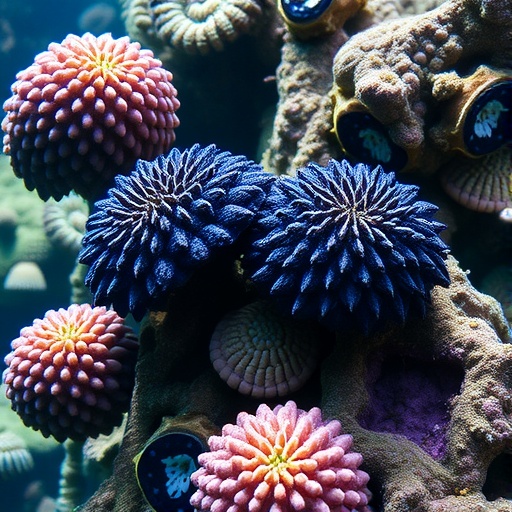In a groundbreaking study, researchers have uncovered significant findings surrounding the stress responses of female black corals under varying current velocities, a revelation that could have profound implications for our understanding of coral ecosystems and their resilience in a changing ocean. The study published in “Coral Reefs” highlights the critical role that sex plays in the stress responses of these marine organisms, providing vital insights into the broader implications for coral health in turbulent marine environments.
Coral reefs, known as the rainforests of the sea, are highly sensitive to environmental changes, particularly in ocean currents. These currents not only affect the physical landscape of reef ecosystems but also impact the biological functions of corals. Within the study, the research team meticulously analyzed how variations in water movement affected female black corals, a species known for its unique traits and ecological importance. Black corals, which can live for hundreds to thousands of years, play a crucial role in reef structures, providing habitats for numerous marine species.
The researchers employed advanced methodologies, integrating both field and laboratory experiments to assess the stress levels of female black corals in response to different current velocities. This dual approach allowed them to create a more comprehensive viewpoint on how environmental factors interact with biological stressors. The results were illuminating, revealing that female black corals exhibited significantly heightened stress responses compared to their male counterparts when subjected to fluctuating currents. Such findings raise intriguing questions about the sexual dimorphism in stress physiology among corals and could lead to a reevaluation of conservation strategies.
Central to the study’s conclusions lies the concept of physiological stress, which encompasses how organisms respond to environmental pressures. In the case of black corals, female specimens displayed increased levels of stress indicators, including hormonal changes and altered metabolic pathways. These physiological changes could influence their reproductive success, potentially leading to broader ramifications for coral population dynamics. Understanding how various stress factors influence sexual differences is crucial in determining how coral ecosystems may adapt—or fail to adapt—under future climate scenarios.
As climate change continues to exacerbate ocean dynamics, the findings of this research are especially timely. The insight that female black corals are more vulnerable to stress could suggest a need for targeted conservation efforts that account for the sex-specific responses of corals to environmental changes. Such a nuanced understanding moves beyond one-size-fits-all solutions and emphasizes the importance of tailored approaches in marine conservation.
Intriguingly, the study presents an opportunity to broaden the lens through which we view marine biodiversity. The focus on sex differences underscores the complexity of life in ocean ecosystems and invites further research into how other coral species might respond to environmental changes. As scientists deepen their understanding of these dynamics, it may become possible to develop more effective conservation strategies that prioritize the resilience of female corals.
Additionally, by recognizing that corals are not monolithic in their stress responses, researchers can better anticipate the challenges faced by coral reefs worldwide. This nuanced understanding could also influence policies surrounding marine protected areas, with a potential shift towards ensuring the protection of habitats that support reproductive populations of female black corals. The cascading effects of such policies could extend beyond the reefs themselves, benefiting a diversity of marine organisms reliant on healthy coral ecosystems for survival.
The implications of the research extend beyond theoretical discourse. Practical applications of these findings could inform aquaculture and restoration projects focused on coral reefs. Efforts to restore damaged reef areas can be enhanced by understanding which populations are more susceptible to stress and, therefore, which should be prioritized in restoration practices. This information could do wonders for increasing the effectiveness of such initiatives.
In summary, the research conducted by Palacios-Castillo and colleagues elucidates an underexplored aspect of coral biology – the role of sex in environmental stress response. With climate change posing significant threats to marine ecosystems, highlighting these nuances is critical. By acknowledging the vulnerabilities of female black corals, conservation strategies can evolve to better protect these vital organisms and, by extension, the rich biodiversity that depends on their survival.
As scientists grapple with the implications of rising temperatures and altered currents, this study serves as a vital reminder of the delicate balance that sustains coral ecosystems. It emphasizes the need for ongoing research and vigilance in conservation efforts, ensuring that the beautiful yet fragile world of coral reefs is preserved for generations to come.
Ultimately, this groundbreaking work not only enhances our scientific understanding but invokes a sense of urgency in addressing the environmental challenges that threaten coral ecosystems globally. It represents a crucial step toward fostering resilience in marine life amidst an era characterized by rapid ecological changes and highlights the importance of comprehensive, sex-aware approaches to conservation.
Subject of Research: Stress responses of female black corals under varying current velocities.
Article Title: Sex matters: female black corals experience higher stress under different current velocities.
Article References:
Palacios-Castillo, L., Navarro-Mayoral, S., Godefroid, M. et al. Sex matters: female black corals experience higher stress under different current velocities.
Coral Reefs (2025). https://doi.org/10.1007/s00338-025-02704-y
Image Credits: AI Generated
DOI:
Keywords: Black corals, stress response, environmental change, marine conservation, sexual dimorphism, climate change.




